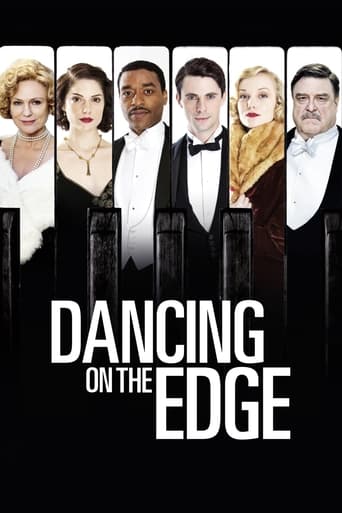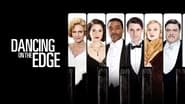freda747
You get the gist of this quickly. Its a mystery set in 1930's England around a black jazz band and the near murder of one of its girl singers. But I was thrown in the first episode by the bizarre way the people were characterized. 1)*** Americans- angry, violent, sexually deviant and slightly uncivilized. No explanation for this. The white American man is insanely rich, fat a woman beater. The black American man was gone from the show fairly quickly. He was incompetent as a manger, thuggishly angry, obsessed with having sex with white women, and - despite having a death sentence waiting for him back in RACIST America- unable to control his violent ego and "attitude" enough to stay out of trouble and not get deported. 2)*** Rich/Royal/ Upper class English- slightly stupid, slightly racist, slightly horny, and potentially dangerous. Black English Jazz band- the band and the music/performances in this program are fairly bad. Not at all what was. 3)*** Black English female singers- This one really threw me! Jesse, the thinner lighter of the 2 singers is being swooned over as if she were stunning. When in fact, the actress is barely attractive. It seems to be an odd English thing to describe mixed race or light skinned people as beautiful without having to actually get one that fits the bill (which an American production would have done). Carla, the darker- but full figured black singer has a much better face. Her bone structure is very striking and on par with the white actresses- yet she is being sold as the less attractive and less talented of the two. Jessie is also being offered as a GREAT singer, when the actresses voice is ...well....nothing. Carla- the darker skinned actress is being played as naive and unambitious, and slightly dim witted- wanting only to prop up her better looking, more talented friend Jess. Its almost bizarre.Of course, the only good people are English and socially in the middle. The white woman photographer willing to love a black man, the black English man- who is very even tempered and plays piano, and the white, lower middle classwriter/manager of the band. *****THIS IS NOT A SPOILER- I have a feeling they will make Carla- the dark skinned girl singer the killer or co-killer (with one of the upper class, stereotypically defective males). She is too tall and too physically large to be good. It fits the weird formula of this mini-series***
Prismark10
This television series from the celebrated Stephen Poliakoff portrays 1930s upper class London but focuses on a Black Jazz band travelling the clubs of Britain, mixing with the high ups of polite British society but reveals an underbelly of prejudice, secrets and murder.Chiwetel Ejiofor plays Louis Lester, trained in the USA but his jazz band takes London by storm when armed with two female singers. Matthew Goode plays a music journalist who champions the band in his music paper. John Goodman turns up as a mogul who wants to buy newspapers.Although there are twists and turns, Poliakoff needs to stick to writing, needs a stronger story editor and get someone else to direct and interpret his words to the screen.It looks good, there is a fine all star cast from Jacqueline Bisset, Jane Asher, Anthony Head. The music and song which was written originally for the series is fine with a few memorable tunes but it meanders too much. The murder story has little mystery as you have a rough idea who the culprit might be.
steven-222
Prepare yourself for six hours of bad writing, bad acting, and really, really bad music.Writer-director Stephen Poliakoff has become the M. Night Shyamalan of British TV drama. He started strong, with dramas that seemed to be new and different and even (hideous new modifier!) award-worthy. Then, with each new project, his threadbare bag of tricks became more familiar and predictable; what once seemed endearingly offbeat became simply irritating, and Poliakoff's narrative deceits became increasingly obvious, no longer distracting us from his inability to create living characters or coherent plots.The downward spiral has led to this sloppy, boring mess of a mini-series. Good luck getting through the whole thing, and if you do, you will almost certainly be disappointed by the limp ending.Particularly irritating is the music. Poliakoff presumes to resurrect a largely forgotten era of British entertainment, but the newly-written songs on offer here do not capture the spirit of the originals. Not only are they displeasing to the ear and badly sung, but the viewer is forced to hear them over and over and over.It is hard to see how Poliakoff's next project can be worse than this, but if the trajectory holds, he will find a way to make it so.
ferdinand1932
While this makes every effort to appear genuine to the period, it is a superficial experience. The realization comes in the third episode when Lady Cremone (Bisset) says of a party that it will be "fun". Anyone who has read Mitford or Waugh, and Gibbons in "Cold Comfort Farm", knows that 'fun' was a banished adjective among people of that class in that period. It's something that the writer ought to know. And while the set design and costumes and overall production is glossy it's like a fashion shoot. That fact comes out in the lack of story and drama - nothing much happens and very slowly for a long time. It has a contrived and much smaller stamp to it. Certainly, it does not justify its time or structure. It might have been done much better in half the time.The music which ought to be central is not and seems of a decade later; in arrangement, style and solo voicing, unconnected to the early 1930s, false when matched against recordings of that time.As to the characters. They are standard TV fare, but only half-formed. They say things as ciphers in some mimicry of what real characters might have said in that period.




